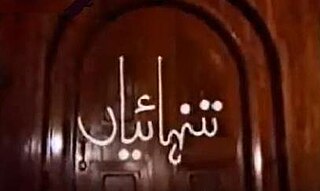
Tanhaiyaan is a 1985 Pakistani drama serial which is now considered a cult classic. Tanhaiyan Naye Silsilay, telecast in 2012, is a sequel to the 27-year-old serial Tanhaiyaan.
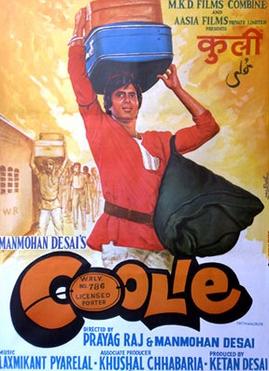
Coolie is a 1983 Indian action comedy film, directed by Manmohan Desai and written by Kader Khan. The film stars Amitabh Bachchan as Iqbal Aslam Khan, a railway coolie, who was separated from his mother Salma due to Zafar's obsession with her. This obsession causes the destruction of her family and her mental breakdown. Years later, fate unites her sons, Iqbal and Sunny and they set out to save Salma from Zafar's captivity. It also starred Rati Agnihotri, Shoma Anand, Suresh Oberoi and Puneet Issar.

Dil Mera Dharkan Teri is a 1968 Pakistani Urdu-language musical romance film produced by Murtaza Aftab and directed by M. A. Rasheed.

Yeh Zindagi Hai is a Pakistani Urdu language comedy-drama television series that showed on Geo Entertainment from 2008 to 2013. It initially starred Javeria Saud, Saud Qasmi, Moammar Rana, Hina Dilpazeer, and Sana Fakhar. It became one of the longest-running television series in the history of Pakistani television, showing for six and a half years with more than 300 episodes. Yeh Zindagi Hai was hugely popular from its premier and made its leading actress, Javeria Saud, an overnight star.

Umrao Jaan Ada is a 1972 Pakistani musical romantic drama film loosely based on the 1899 novel of the same name by Mirza Hadi Ruswa and directed by Hassan Tariq with lyrics and screenplay by Saifuddin Saif. Rani played the title role in the film opposite Shahid while Nayyar Sultana, Zmurrud, Aasia, Rangeela and Allauddin appeared in supporting roles. It revolves around the entire life journey of a tawaif from Lucknow and her tragic romance with a Nawab. The film was a golden jubilee hit at the box office. Lok Virsa Museum screened the film in 2017 as part of special showcase of the feature films in the country.
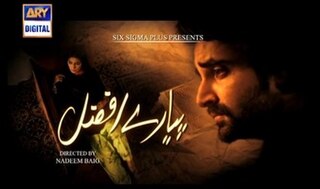
Pyarey Afzal or Pyaare Afzal, is a 2013 Pakistani romantic melodrama television serial that aired on ARY Digital. Directed by Nadeem Baig and written by Khalil-ur-Rehman Qamar, the drama was produced by Humayun Saeed and Shazad Nasib's Six Sigma Entertainment. The drama starred Hamza Ali Abbasi and Ayeza Khan in lead roles.

Jackson Heights is a 2014 Pakistani light comedy-drama serial, that follows the lives of overseas Pakistanis and Indians living in the Jackson Heights neighborhood of New York City in Queens. It is directed by Mehreen Jabbar, written by Vasay Chaudhry and produced by Humayun Saeed and Shehzad Nasib. The serial features an ensemble cast including Marina Khan, Adeel Hussain, Aamina Sheikh, Noman Ejaz, Ali Kazmi, Adnan Jaffar, Naghma and Neelofar Abbasi. The English cast are: Monsoon Bissell, Theo van Golen, and Alma Mooz Nunez.

Sadqay Tumhare is a Pakistani biographical drama serial based on the life of the series' own writer Khalil-Ur-Rehman Qamar. It is directed by Mohammed Ehteshamuddin and co-produced by Momina Duraid, Samina Humayun Saeed and Tariq Ahmad Shah. It stars Mahira Khan, Samiya Mumtaz and Adnan Malik, who made his acting debut with this serial.
Pagli, is a Pakistani romantic drama serial that first aired on 28 August 2017 on Hum TV. It stars Noor Hassan Rizvi, Hina Altaf, Asim Azhar, and Hira Salman in lead roles.

Kahan Ho Tum is 2018 a Pakistani television serial directed by and produced by Zulfiqar Haider and written by Sabika Zainab.The drama featured Affan Waheed, Faisal Rehman and Sumbul Iqbal in lead roles. Set in the Walled City of Lahore, the series revolves around the cruel behaviour of society faced by a girl who doesn't involve in the activities of Kotha but only lives there.

Sannata is a Pakistani drama serial aired on ARY Digital. It is directed by Kashif Nisar and written by Saji Gul and stars Saba Qamar, Danish Taimoor and Sajal Aly in the lead. Abdullah Seja and Nauman Masood produced the drama under their production banner Idream Entertainment.
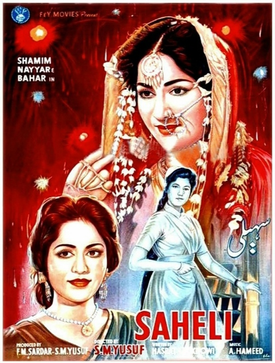
Saheli is a 1960 Pakistani Urdu language music blockbuster classical film directed by S. M. Yusuf and co-produced by F. M. Sardar.
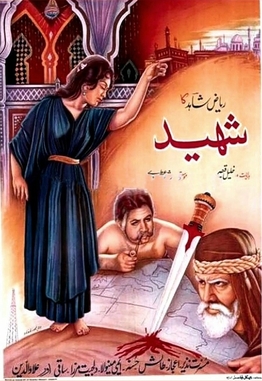
Shaheed is a 1962 Pakistani Urdu language music blockbuster classical film directed and produced by Khalil Qaiser under the production banner of K. K. Productions, and was a new banner that Qaiser formed.
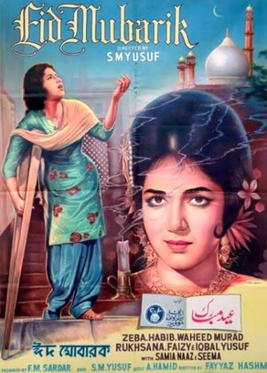
Eid Mubarak is a 1975 Pakistani muslim social directed by S. M. Yusuf who also wrote the screenplay for the film, based on a story written by Fayyaz Hashmi. It features Waheed Murad, Zeba, Habib and Rukhsana in leading roles. The film had songs performed by Mala, Ahmed Rushdi and Munir Hussain and a Naat in the music composition of A. Hameed. The film performed well at the box office and was a silver jublee hit. It won a Nigar Award for Best sound editing.
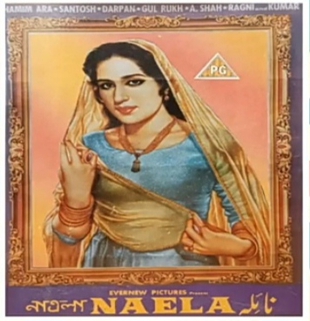
Naila is a 1965 Pakistani musical romance drama film, directed by Sharif Nayyar, who also wrote the screenplay. The film is based on the novel of the same name by Razia Butt. It stars Shamim Ara in the title role with Santosh Kumar and Darpan in substantial roles. The film revolves around Naila, who loves her fiancé Zafar, but Zafar's brother falls for her.
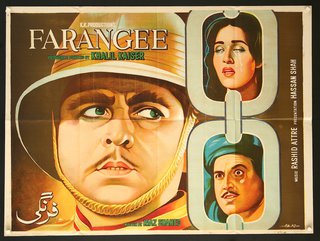
Farangi is a 1964 Pakistani Urdu film. It is directed by Khalil Qaiser and written by Riaz Shahid. It was the second film produced by Khalil Qaiser's newly formed K. K. Productions. The film stars Sudhir, Shamim Ara and Agha Talish with Bahar Begum and Allauddin.

Waadah is a 1957 Pakistani musical romance film directed by W.Z. Ahmed. It is the first film that Ahmed made in the country after he migrated to Pakistan and he made two films in Pakistan. Sabiha Khanam and Santosh Kumar played the lead roles in the film.
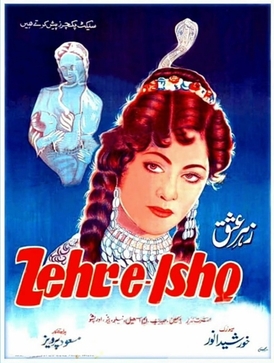
Zehr-e-Ishq is a Pakistani romantic musical film released in 1958. Following Intezaar, Zehr-e-Ishq is the second film featuring Masood Parvez as a director, Khwaja Khurshid Anwar as a producer, music composer and writer, Qateel Shifai as a lyricist, and Syed Imtiaz Ali Taj as a screenwriter. Musarrat Nazir, Habib ur Rehman and Yasmin appeared in lead roles in the film.

Clerk is a Pakistani film directed by Khalil Kaiser, who also played the titular role of a poor clerk tired of his economic condition and hectic daily routine. It marked his only appearance as an actor. It also stats Musarrat Nazir and Ratan Kumar in important roles. The story was written by Younis Rahi with dialogues by Riaz Shahid. Safdar Hussain was the music composer.

Khushboo (transl. Fragrance) is a 1979 Pakistani film directed by Nazar Shabab. It is produced by A. Hameed and music was composed by M. Ashraf. The lead cast of the film includes Rani, Shahid, Mumtaz with Nayyar Sultana and Rangeela in the supporting cast. It was released on 25 August 1979, on the occasion of Eid-ul-Fitr, and was a golden jubilee hit at the box office.



















